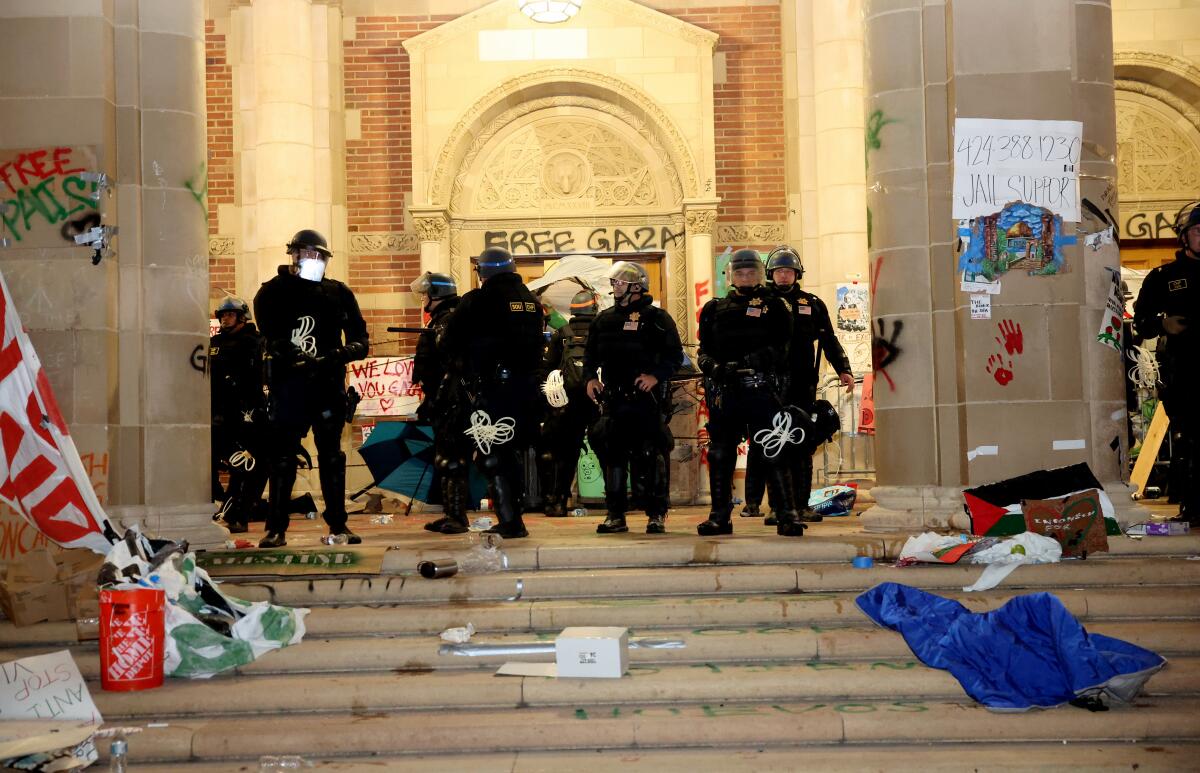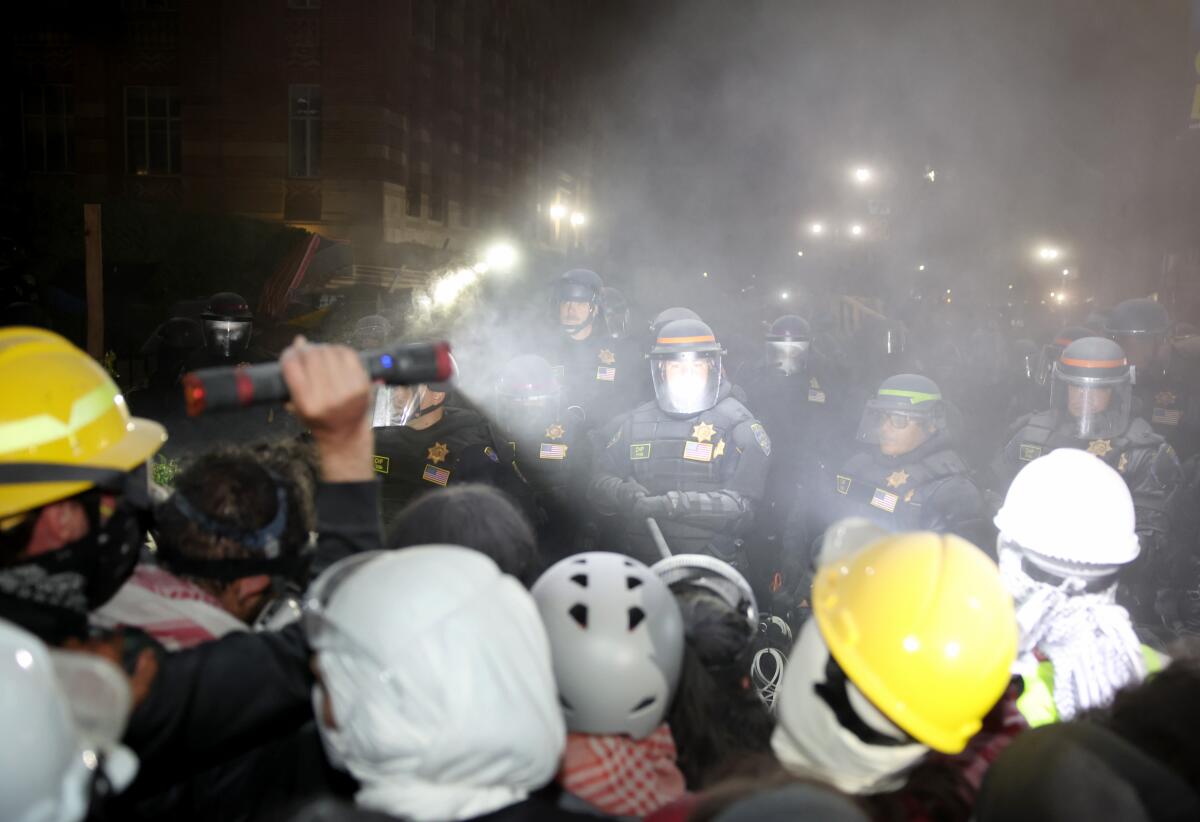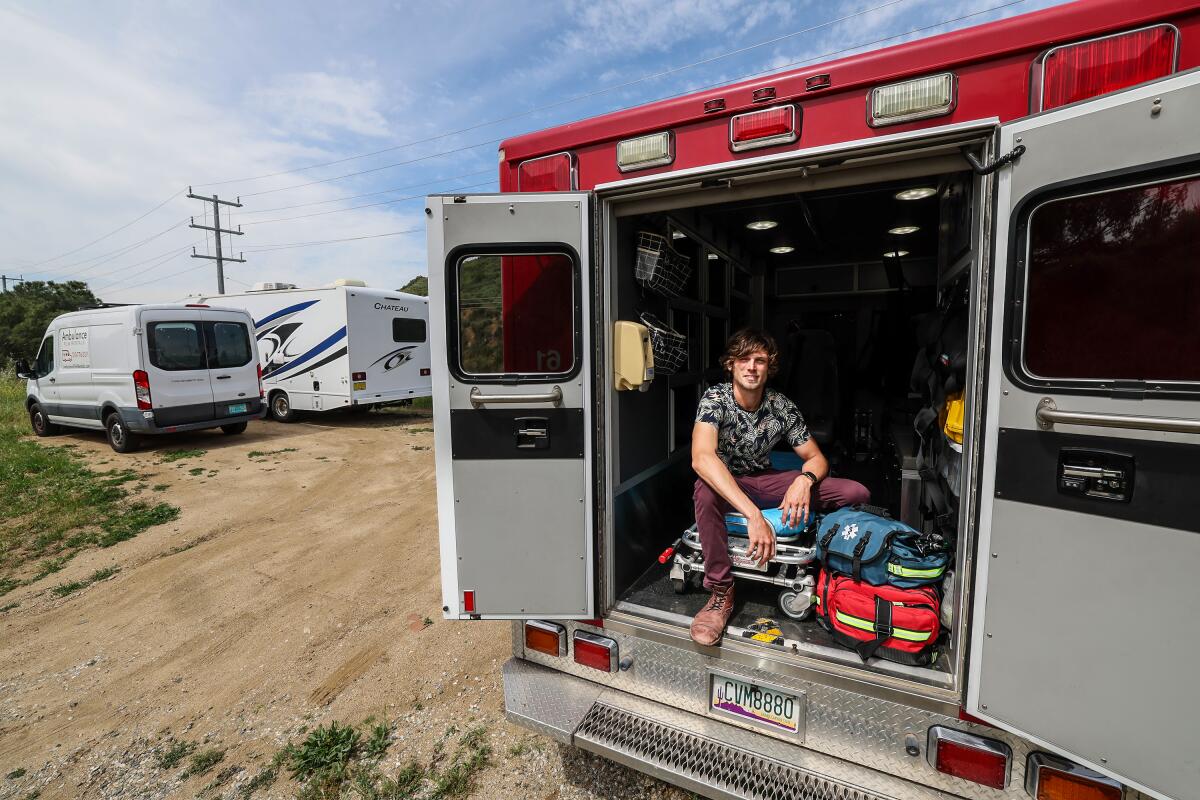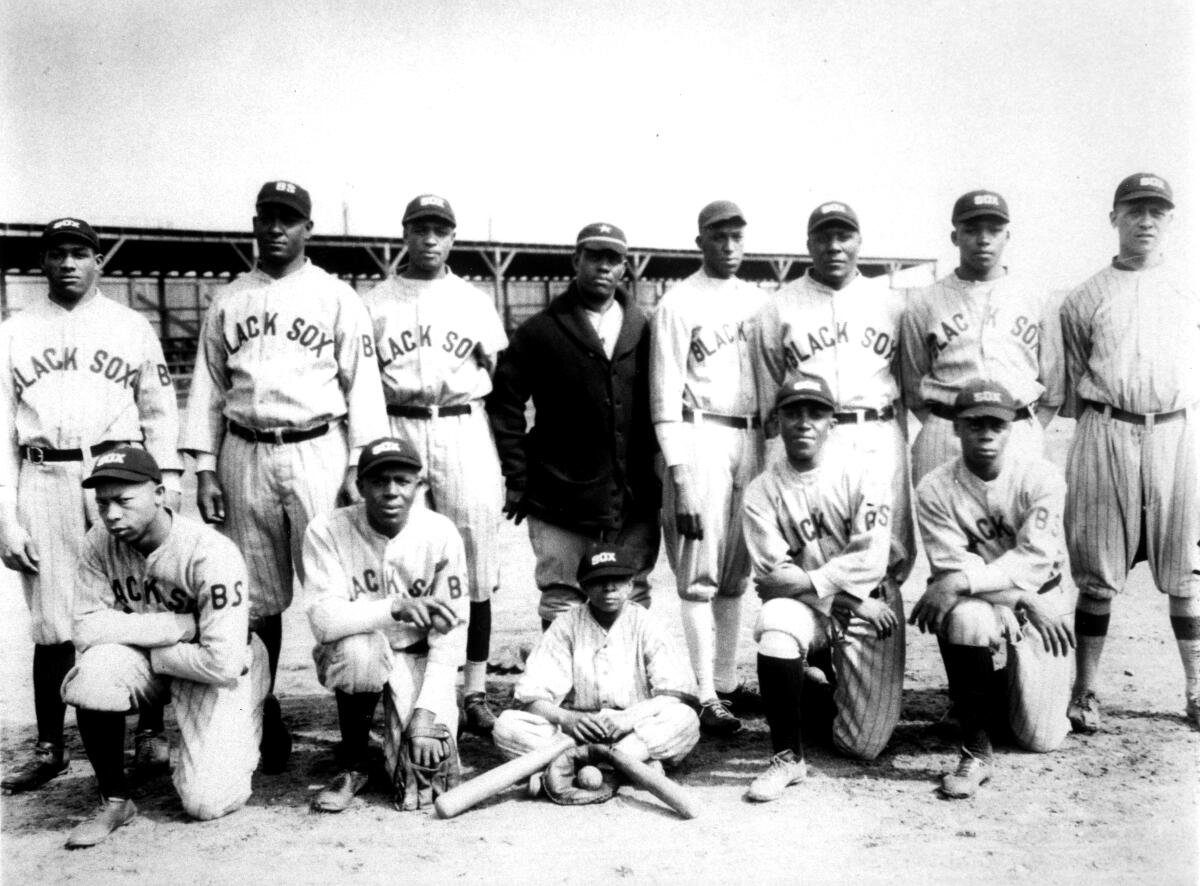UCLA violence: The world is watching

- Share via
Good morning. It’s Thursday, May 2. I’m Jaweed Kaleem, an education reporter at The Times. Here’s what you need to know to start your day.
- UCLA Pro-Palestinian camp comes under attack by counterdemonstrators
- LGBTQ+ people in Huntington Beach are fearful of what they say is a rise in hostility
- The best places to eat and drink in L.A. this month
- And here’s today’s e-newspaper
You're reading the Essential California newsletter
Our reporters guide you through our biggest news, features and recommendations every morning
You may occasionally receive promotional content from the Los Angeles Times.
Violence at UCLA: The world is watching
I spent Wednesday fielding requests from worldwide broadcast news outlets — in Atlanta, London, Dublin, Singapore and elsewhere. The anchors all had the same question: What happened at UCLA?
After nearly seven months of global protest over the Israel-Hamas war and the emergence of dozens of student encampments at U.S universities, it seemed the world — at least for a day — had its eyes on California. News broadcasters wanted to understand the line between free speech and hate speech, how private universities such as USC handle protests compared with public ones such as UCLA, and how colleges decide when to call in the Los Angeles Police Department or other law enforcement.
It’s hard to explain a complex protest movement and the reactions to it in a soundbite. I told foreign news outlets that student protesters across the board are asking for divestment from Israel — something many universities have resisted — and that typically pro-free speech colleges are struggling with the biggest wave of campus demonstrations since the 1960s anti-war movement.
It’s become further complicated because pro-Palestinian chants and phrases are deemed antisemitic and “genocidal” by pro-Israel groups. Complaints of anti-Arab and anti-Muslim hatred have grown too. Many students are frightened.
At UCLA, the situation devolved Wednesday morning into what Chancellor Gene Block called “a dark chapter in our campus’ history.”
UCLA violence

The news outlets’ urgent interest came after counterprotesters attacked a pro-Palestinian encampment at the university beginning late Tuesday night and into early Wednesday morning before the LAPD and California Highway Patrol showed up to quell the melee.
The violence came not long after the university had declared the encampment, which emerged a week ago, to be in violation of campus policy. The UCLA camp is similar to dozens of pro-Palestinian tent camps at U.S. universities. Clad in black outfits and white masks, counterdemonstrators tried to tear down the barricades surrounding the encampment.
People inside the camp, some holding lumber and wearing goggles and helmets, rallied to defend the site’s perimeter.
Over several hours, counterdemonstrators hurled objects, including wood and a metal barrier, at the camp and those inside. The large, mostly male crowd sprayed bear mace, ignited stink bombs and tossed fireworks near the camp perimeter — and in at least one case inside the camp. Fights repeatedly broke out. Some tried to force their way into the camp, and the pro-Palestinian side used pepper spray to defend themselves.
Protesters and onlookers from the site said that at least 15 people were injured.
By early Thursday morning police had moved into the encampment, dismantled many of the tents, pushed out most of the protesters and made numerous arrests.
Jewish organizations have condemned the violence, saying it does not represent the pro-Israel movement.
“The abhorrent actions of a few counter protesters last night do not represent the Jewish community or our values. We believe in peaceful, civic discourse,” the Jewish Federation said in a statement.
The Los Angeles chapter of the Council on American-Islamic Relations has also stepped in.
“We strongly condemn this mob of pro-Israel extremists for violently attacking students at the UCLA encampment last night and we call on political leaders to do the same,” CAIR-LA Executive Director Hussam Ayloush said in a statement. “Free speech should never be met with crimes of hate. The pro-Israel extremists responsible for last night’s violence must be identified and prosecuted.
A team of Times reporters compiled a timeline of how the violence at UCLA unfolded, explained details of the attack from inside the camp, and why it took hours for police to quell it. Four UCLA student journalists described how they were among those attacked.
In a letter to the University of California Board of Regents obtained by The Times, UC President Michael V. Drake wrote that there is “sufficient confusion” surrounding the violence that he was ordering an independent review of the university’s planning, its actions and the response by law enforcement.
Campus fears
The UCLA violence has highlighted the intense fears among college students across the country as the Israel-Hamas conflict foments escalating campus protests and reports of physical and verbal assaults, doxxing and threats to academic and professional careers.
Times staff writer Teresa Watanabe reported on a new national study led by the University of Chicago that has for the first time documented those fears in detail as well as reasons for them — along with student attitudes toward genocide, antisemitism, Islamophobia and possible ways to calm tensions.
The study found that 58% of students who identified as Jewish and 52% of those who said they were Muslim have feared for their safety since Oct. 7. An additional 16% of neither background also expressed fears. This represents as many as 3 million students across the country.
“The campus fears are more intense and more widespread than what we’ve previously known,” said Robert Pape, a University of Chicago political science professor and director of the Chicago Project on Security and Threats who wrote the report.
In one finding, about 10% of college students would permit student groups to call for genocide against Jews, and 13% of college students say that when Jews are attacked, it is because they deserve it. The same percentage would permit that call against Muslims.
Read more: Massive police operation breaches UCLA pro-Palestinian encampment, makes arrests.
Today’s top stories

Politics
- Controversial recount breaks tie in Silicon Valley congressional race.
- A campaign to erect a new city on Solano County ranchland submits signatures for the November ballot.
- Crime is a ballot ‘vulnerability’ for California Democrats after Schiff, Bass break-ins.
- Arizona Senate votes to repeal 1864 abortion law, leaving state with 15-week ban.
Crime and courts
- As court overturns a lot-splitting law, SB 9, one early adopter asks why.
- Prosecutors seek September retrial for Harvey Weinstein after N.Y. rape conviction was tossed.
- Do dying people have a ‘right to try’ magic mushrooms? 9th Circuit weighs case.
Sports
- Mayor Bass deletes tweet after Lakers’ season ends: ‘At least we won the in season tournament!’
- The Dodgers bullpen was turning a corner. Now, a spate of injuries has cut into its depth.
More big stories
- Stagecoach and Coachella fans leave behind tons of camping gear, clothes, food. Here’s what happens to it.
- Are Tesla Superchargers really open to other EVs in California? It’s complicated.
- A slice of tourists hasn’t returned since COVID. L.A. wants them back.
- The San Gabriel Mountains National Monument is expanding by more than 100,000 acres.
- Desert farmers share their best tips on how to grow food in hot, dry conditions.
- Fire scorches Huntington Park fire station, but no injuries are reported.
- LGBTQ+ people in Huntington Beach are fearful of what they say is a rise in hostility.
- Little Tokyo is named one of America’s most endangered places by a preservation group.
Get unlimited access to the Los Angeles Times. Subscribe here.
Commentary and opinions
- Steve Lopez: From a Tommy’s security job to a ride home on Metro, her last hours alive.
- Mary McNamara: No one has more contempt for America than Donald Trump himself.
- Jackie Calmes: Kristi Noem executed her dog. She’s not the only Trump veep wannabe who shouldn’t be in the running.
- Anita Chabria: Our immigration problem isn’t what Trump says it is.
- Michael Hiltzik: How the GOP — with Democratic Party connivance — has undermined a crucial effort to avert the next pandemic.
Today’s great reads

An ambulance, an empty lot and a loophole: One man’s fight for a place to live. Cameron Gordon couldn’t afford a rental, so he bought an ambulance to sleep in. He couldn’t afford to buy a house, so he bought a vacant lot where he’s created a hillside oasis — thanks to a loophole in the municipal code.
Other great reads
- This artist sued to remove homeless people. They also have been his friends and inspiration.
How can we make this newsletter more useful? Send comments to essentialcalifornia@latimes.com.
For your downtime
Going out
- 🍰 🦪 The best places to eat and drink in L.A. this month, according to our food writers.
- 🤑 Inside the secret poker games opening doors in L.A.’s art scene.
Staying in
- 💻 For the first time ever, ‘Blood In Blood Out’ will be available for streaming.
- 📚10 books to add to your reading list in May.
- 🧑🍳 Here’s a recipe for Greek-ish grilled half-chickens.
- ✏️ Get our free daily crossword puzzle, sudoku, word search and arcade games.
And finally ... from our archives

On May 2, 1920, the Negro National League held its first baseball game. It was considered the first successful professional baseball league for African Americans.
During the league’s 100th anniversary, The Times’ Jack Harris wrote about its history amid racial inequality.
Have a great day, from the Essential California team
Kevinisha Walker, multiplatform editor and Saturday reporter
Christian Orozco, assistant editor
Stephanie Chavez, deputy metro editor
Karim Doumar, head of newsletters
Check our top stories, topics and the latest articles on latimes.com.
Sign up for Essential California
The most important California stories and recommendations in your inbox every morning.
You may occasionally receive promotional content from the Los Angeles Times.








